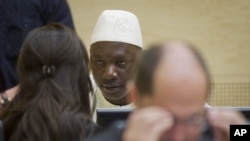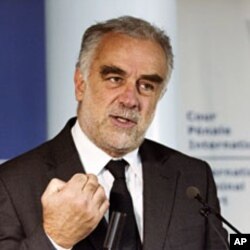Wednesday’s conviction of Thomas Lubanga at the International Criminal Court (ICC) on charges of recruiting child soldiers in the Democratic Republic of Congo (DRC) was a historic moment for the institution - the first successful prosecution in its 10-year history. But analysts say the ICC is still far short of becoming a truly international court of justice.
Luis Moreno-Ocampo
"An international court investigated the suffering of some of the most vulnerable members of humanity - children in war zones," he said. "The court provided a fair trial to the suspect and convicted him. It is a victory for humanity."
The charges in Lubanga’s conviction were based solely on the use of child soldiers.
ICC analyst Phil Clark of the University of London, says the scope and reach of the court remains limited.
“I think there’s growing skepticism about whether the ICC can change conflict dynamics on the ground," Clark said. "I think there’s a feeling that the court is still a very distanced institution, it’s based in the Hague, it doesn’t touch the lives of people on the ground.”
Africa
In addition to the Democratic Republic of Congo, the ICC prosecutor has opened investigations into seven other situations in Africa.
Among them is the inquiry into the Lord's Resistance Army, originally from Uganda, whose leader, Joseph Kony, is also accused of the forcible recruitment of tens of thousands of child soldiers.
Kony gained worldwide media attention in recent days after an online video made by the advocacy group Invisible Children, highlighting the allegations against him, spread all over the internet.
But analyst Phil Clark says the court has been inconsistent in its targets.
“A good example of this recently is the fact that the ICC stood by while the Ugandan government fired on its civilians after the elections last year," he said. "That’s an example of a country that the ICC has been working in for a very long time, where there’s been no change in the conflict.”
Politics
Three permanent members of the United Nations Security Council - the U.S., Russia and China - have refused to sign up with the International Criminal Court, citing fears of politically-motivated prosecutions.
Clark says ICC Prosecutor Ocampo is building a warmer relationship with President Barack Obama.
“He’s very pleased that the U.S. has allowed investigations both in Darfur and also recently in Libya, which shows that the U.S. perhaps is warming to the ICC," said Clark. "But it’s only when those big powers come on board and are willing to subject their own personnel to prosecutions that we can argue that this has become a truly global institution.”
Ocampo leaves office in June, to be replaced by Fatou Bensouda of Gambia - the first time an African will hold the chief prosecutor job.





